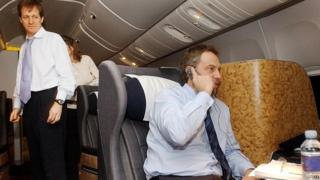 Image copyright
Image copyright
PA
MPs authorised the decision to go to war but many felt they had been let down by Tony Blair
Parliament must be able to investigate whether it was misled over the Iraq War if “new facts” emerge, MPs have said.
The Public Administration Committee said last year’s Iraq Inquiry report had, for many, failed to “provide closure” on an conflict which had left an “indelible scar” on UK politics.
A further probe might be warranted if “relevant material” emerged, it said.
It also said civil servants should have greater scope to challenge decisions if procedures were not properly followed.
- Q&A: What was the Chilcot report?
- The Iraq War’s hard lessons
- The bereaved still looking for the truth
The Iraq Inquiry, published last July, concluded that the then prime minister Tony Blair had overstated the threat posed by Iraqi leader Saddam Hussein, sent ill-prepared troops into battle in 2003 and had “wholly inadequate” plans for the aftermath.
The report, which took seven years to produce, found there was no “imminent threat” from Saddam and the intelligence case for war was “not justified”.
In light of these failings and after conducting a “lessons learned” exercise, MPs on the cross-party committee have made a series of recommendations about the conduct of future public inquiries and the machinery of government. They are calling for:
- An urgent assessment into how the Inquiry could have been expedited
- MPs to be given a vote in advance on the terms of reference of future inquiries
- The powers of the National Security Council to be beefed up
- Ministerial advisers to be able to state objections if decision-making protocols are by-passed
- “Culture of challenge” at key meetings to be investigated
- Greater cross-department working with single minister in charge of complex issues
Last November, MPs rejected an SNP motion calling for Mr Blair to be held to account for what he told Parliament in the run-up to the war.
Further action against Mr Blair – who has apologised for any mistakes made but not the decision to go to war – is supported by some of the relatives of the 179 British personnel who died in Iraq between 2003 and 2009.
‘More critical’
The committee noted that many MPs who supported the decision to go to war in 2003 have since changed their minds and denounced it. But they said it was clear Parliament could have been “more critical and challenging” of the government’s justification for military action at the time.
It noted that the Iraq Inquiry had reached the view that Mr Blair had not personally set out to deceive MPs about Iraq’s military capability but it said the question of whether Parliament was misled was still “constantly raised” and could merit further investigation.
“After taking advice, we do not feel that Chilcot or any other inquiries provide a sufficient basis for the committee to conduct such an inquiry.
Image copyright
Getty Images
MPs said collective decision-making had broken down in the run-up to the war
“However, we think Parliament should be prepared to establish such an inquiry into the matter if any new and relevant material or facts emerge.”
Among those who gave evidence to the committee included Iraq Inquiry chair Sir John Chilcot and Cabinet Secretary Sir Jeremy Heywood, who is the UK’s top civil servant and played a key role in negotiations between the Inquiry and Downing Street about the declassification of secret material, including private correspondence between Mr Blair and US President George W. Bush.
The committee’s report, which will be debated by MPs on Thursday, said Sir Jeremy and other top civil servants should have greater powers to intervene in the event of a “breakdown in collective ministerial decision-making” as it claims happened in the run-up to the Iraq conflict.
‘Ignored’
Should officials be concerned that procedures set out in the Cabinet Manual are not being followed, it says they should be able to record their concerns by issuing a formal ministerial direction or notifying Privy Counsellors.
Conservative MP Bernard Jenkin, the chair of the committee, said the cabinet had been effectively “sidelined” in the run-up to the war and that strong safeguards were needed to stop this from happening again.
“When Tony Blair wanted to write that letter to President Bush saying ‘we will be with you whatever’, officials tried to stop him but he ignored them,” he told the BBC.
“They said cabinet had not been consulted but he said ‘send it anyway’. That should not be allowed to happen.
“Just as civil servants can call out what they think is a bad decision in financial decisions, the officials should be able to ask for a letter of direction if cabinet procedure is being by-passed.”
A Cabinet Office spokesman said it was “always looking at ways to improve and refine how government works”.
“This report will be considered as part of our ongoing work to ensure we have robust processes in place to deliver efficient public services and effective decision-making within government,” it said.
Iraq Inquiry: New facts would justify fresh probe say MPs}

